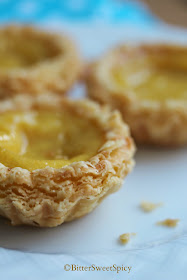It's already the third week of Ramadhan, but I've been rather slow with updating this space. I've been hoping to share the recipes of what I shared in the FB Page & Instagram but time is just not on my side..... sorry about that.
So I've started with my Hari Raya baking on Monday. First on my list was the pineapple tarts using my favourite recipe. Then on Tuesday, I spent a good part of the morning making Bangkit Putri Salju, a cheesy version of the traditional snow cookies. For this recipe, instead of nuts, parmesan cheese is added. It also calls for the addition of tapioca flour, besides plain flour. Hence the name Bangkit Putri Salju....
I decided to make these cookies after tasting the sample after my cookie-baking class. They are rich & very addictive. However, if you don't like cheese, the smell of the parmesan cheese can be quite overwhelming before the cookies are baked, so be warned.
Bangkit Putri Salju
Ingredients:
300g butter (softened) - I used unsalted butter.
200g powdered sugar
1 tsp vanilla essence (I used vanilla paste.)
1/2 tsp salt
60-70g egg yolk (3-5 size AA egg) - I used 4 egg yolks.
80g parmesan cheese (grated)
60g milk powder (I used full-cream Nespray milk powder.)
350g plain flour (I used top flour.)
100g baked or fried tapioca flour (read notes below)
80g cornflour
400g powdered sugar / icing sugar for coating the cookies
Method:
- Combine the 3 flours & sift. Set aside.
- Combine butter, sugar, vanilla essence, salt, egg yolks, cheese & milk powder in a mixing bowl & mix thoroughly until well blended. (I used a wooden spoon.)
- Add in the flour & mix thoroughly to form a dough.
- Place the dough on a lightly floured surface or between two pieces of plastics & roll it out to 1cm thickness. Cut into desired shapes with cookie cutters. Place cookies 1 cm apart onto baking pan lined with grease paper.
- Leave cookies in room temperature for at 3 hours to dry them so that the shape of the cookies will be maintained when baked.
- Preheat the oven to 140 deg C, fan forced.
- Bake for about 30 - 40 minutes in the preheated oven, turning the tray halfway through, until lightly browned. Allow cookies to cool on baking sheet for 5 minutes before removing to a wire rack to cool completely.
- Coat the cookies with powdered or icing sugar & store in air-tight container.
Notes:
- The tapioca flour must be fried or baked before weighing. To fry, place flour in a clean & dry pan & fry it over small fire until it's light. I like to bake it in the oven as it's less messy. To bake, place flour in a baking pan lined with baking paper. Bake in 100 deg C oven for about 1 hour, stirring the flour every 10 minutes. I baked 500g of flour, so if you are baking a smaller amount, you need to bake less than 1 hour.
- This recipe makes a lot of cookies. I shaped into small crescents & it yielded more than 200 pieces.









